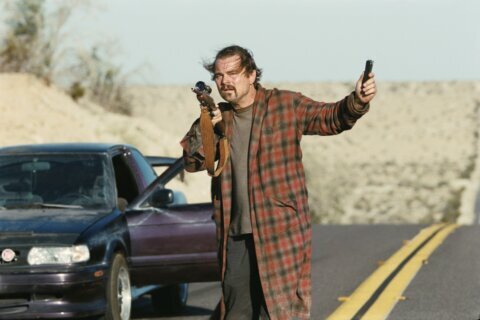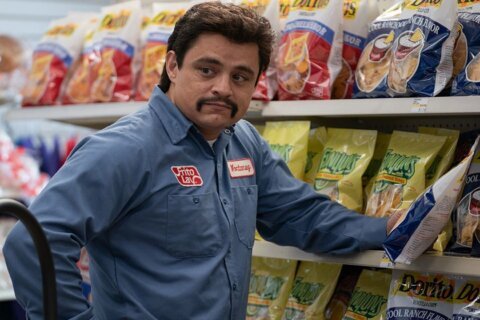Jason Fraley, WTOP Film Critic
WASHINGTON – Today’s teens are turned on by “Twilight,” but a half century ago, they were still lusting for vampires on TV’s “Dark Shadows” (1966-1971). For many, the daytime soap opera was a “can’t miss” afternoon event, airing back-to-back with “General Hospital.”
When I heard it was getting re-“vamped” for the big screen, I was skeptical. But when I heard it was Tim Burton and Johnny Depp doing it, my ears suddenly perked up. After all, this was the same duo that romanticized sexy fangs in “Ed Wood” (1994): “Take my word for it. If you want to make out with a young lady, take her to see ‘Dracula.'”
The duo pairs for the eighth time after “Edward Scissorhands” (1990), ” Ed Wood” (1994), “Sleepy Hollow” (1999), “Charlie and the Chocolate Factory” (2005), “Corpse Bride” (2005), “Sweeney Todd” (2007) and “Alice in Wonderland” (2010).
This time, they track Barnabas Collins (Depp), an 18th century vampire who returns to live in his former New England estate, Collinsport Manor. Only now, it’s 1972, and its new inhabitants — matriarch Elizabeth Collins Stoddard (Michele Pfeiffer), brother Roger (Jonny Lee Miller), rebellious teen Carolyn (Chloe Grace Moretz), neglected son David (Gulliver McGrath), haunted visitor Victoria (Bella Heathcote) and family psychiatrist (Helena Bonham Carter) — quickly realize the 200-year-old Barnabas is out of touch in the 20th century.
The premise is fitting for a TV series resurrected in a different era, buying itself some leeway to deviate from Jonathan Frid and the original show. It also makes for some clever “fish out of water” moments that are at best side-splitting and at worst amusing. When Carolyn complains, “She pretends to be a rocker, but she’s into The Carpenters,” Depp replies, “Oh, so she has a penchant for woodmanship.” When Depp asks Pfeiffer to assemble his horses, she replies, “We don’t have horses. We have a Chevy.”
Like Burton and Depp, Pfeiffer was a fan of the original TV series, having watched it growing up. So she agreed to make her first Burton appearance since Catwoman in “Batman Returns” (1992), rejoining Burton’s recurring stable of Depp, Bonham Carter (her seventh with fiance Burton) and Hammer Film horror vet Christopher Lee (his fifth). Making her first appearance in a Burton movie is the voluptuous Eva Green, who was a killer Bond girl in “Casino Royale” (2006) and who won the role of “Dark Shadows” villain Angelique over Anne Hathaway, Lindsay Lohan and Jennifer Lawrence.
Still, the film belongs to Depp, who hypnotizes us with expressionist hand gestures and believable inner torment. He creates a gentleman monster who’s as experienced in bloodlust as he is naive to the ways of the modern world. His pale-faced innocence is reminiscent of “Edward Scissorhands” with another Danny Elfman score and trademark “orphan” themes.
Scholar David Thomson once charted the string of tortured childhood souls through Burton’s career, noting that “Vincent” (1982) shows the “nightmarish inner life of an outwardly ordinary child”; “Pee Wee’s Big Adventure” (1985) stars an immature kid who never grew up; “Beetlejuice” (1988) is “a rogue sprite, a kind of Peter Pan”; “Edward Scissorhands” is left incomplete by his Inventor father figure; and The Penguin in “Batman Returns” was born so ugly, his parents sent him adrift in the sewers, like “Moses in Harry Lime Land.”
To that list, I will also add “Batman” (1989), whose title character is orphaned by the smoking gun of Nicholson’s Joker; “Big Fish” (2003), all about a child trying to connect with his dying father; “Charlie and the Chocolate Factory” (2005), where Wonka creates for himself a children’s fantasyland; and “Sweeney Todd” (2007) where a rough childhood leads to a life of crime. Such thematic throughlines play into the “auteur” or “author” theory, the notion that “there are no bad movies, only bad directors.” I don’t buy this entirely (there are indeed bad movies), but I adore the notion of consistent authorship. It means that even when a filmmaker’s movies aren’t his best work, they’re still worth watching to see his/her consistent signature.
Few directors have such a distinct style that you can look at any one of their films and within seconds identify who’s directing. One note from Elfman, one gesture by Depp, one excessively dark or candy-colored land of imagination, and you can instantly say, “This is a Tim Burton film.”
Burton is a natural born visual storyteller, with some clever directing techniques at play in “Dark Shadows.” The death scenes are poetic, largely happening off-screen. Low-angle shots show the Collins family members alienated at the dinner table. “Slow disclosure” reveals hilarious modern items like McDonald’s arches and Operation board games. And “diegetic sound” takes what we think is music on the soundtrack and shows us that it’s actually emanating from an on-screen source, like Depp accidentally starting the electronic beat of an organ, or Karen Carpenter singing on TV.
Even little touches show an understanding of movies past, like “Deliverance” on the theater marquee. Sure this sets the time of 1972, but doesn’t the final sequence of “Deliverance” suggest the town was cursed for digging up coffins?
The icing on the cake is Burton’s continued push for art design and special effects, having cinematographer Bruno Delbonnel (“Amelie”) shoot the ghost scenes in an underwater tank to give them an other-worldly feel, and enlisting Oscar-winning make-up artist Joel Harlow (“Star Trek,” “Pirates of the Caribbean”) to paint skin so pale that it breaks like porcelain in the finale.
Yes, “Dark Shadows” is more style than substance, with a sloppy plot, bizarre Alice Cooper cameo and an over-the-top ending that finds Pfeiffer firing a gun atop a staircase against her own “Scarface” advice: “Nothing exceeds like excess.” It’s a reminder that Burton has slipped over the past decade, and purists to the original TV series could very well walk out disappointed.
But for me, the jokes are so delicious, the lead performance so captivating, and the director so comfortable in his campy macabre world, that it’s pretty hard to resist.
★ ★ ★
The above rating is based on a 4-star system. Read more from WTOP Film Critic Jason Fraley by clicking “Fraley on Film” under the “Living” tab above, and check out his blog, The Film Spectrum.
(Copyright 2012 by WTOP. All Rights Reserved.)








